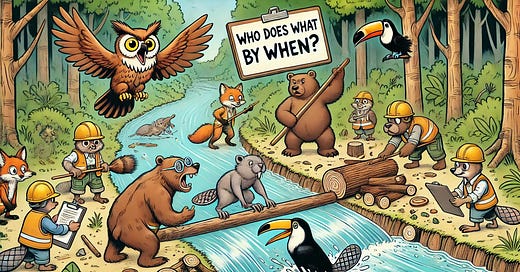In this edition
Who does what by when? [repost from LinkedIn]
Stuff you might like
Who does what by when?
What probably happens when action items do not have owners or timelines? 😒
I use a simple question to ensure proper ownership and accountability for plans and action items: “who does what by when?”
A founder recently showed me a doc, and I immediately pointed out that the action items had owners but not dates. 🚩
When I was operating, I developed the habit of asking “who does what by when” whenever I saw plans and action items. It significantly improved my ability to help my team execute, and it’s now completely automatic.
It sounds simple, but building the discipline to consistently ask this takes practice, and I’ve noticed it’s not as widespread as you might think.
I further explained to the founder that:
🧩 “Who”. “what” and “[by] when” are the core primitives for executing any plan.
🎯 The strategy is the “why” underlying a plan.
🤔 Whether, and to what extent, to get into “how” to do something depends on the context, and is more of a case-by-case decision.
On the last point: it’s frequently important for leaders to “inspect” and dive into details, which is the core behaviour underlying “founder mode”. But it’s not easy to do this effectively without disempowering, discouraging or slowing down the team. That’s perhaps for another post.
Stuff you might like
If you’re like me (and most other people), you probably greeted post-pandemic life with immense relief at not having to wear masks or social distance anymore, now that Covid is endemic. So this article about the health risks from repeated Covid infections (spoiler alert: it can be much worse than repeated bouts of flu or colds) gave me a lot of pause. Maybe the answer is to continue getting vaccinated.
Howard Marks from Oaktree Capital is known for his notes on investment, and he recently published his first video, a pretty good primer on how to think about risk. This Business Insider article summarises it quite well.
Here are some quick tips from the CIA and FBI on clues that someone might not be telling the truth. They’re not definitive, but if you see these behaviours, it’s a pretty strong signal to at least be skeptical.




